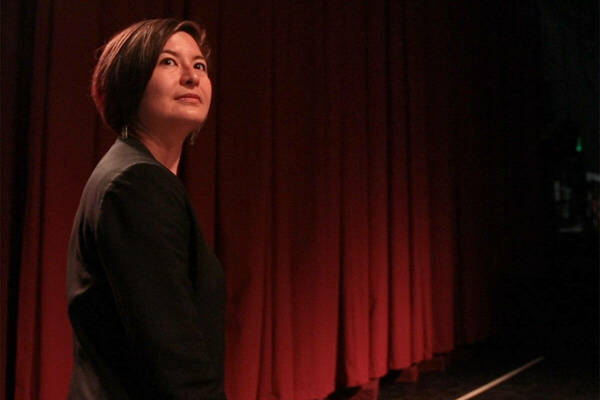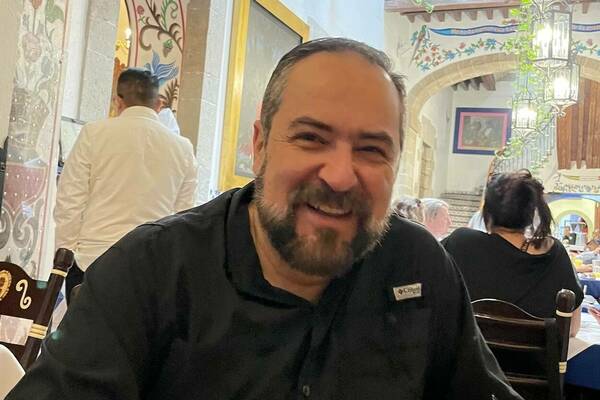
Benjamin Radcliff, a professor in the Department of Political Science at the University of Notre Dame, died June 10 after a long illness. He was 60.
Radcliff’s scholarly work focused on the intersection of American and comparative politics. He made significant research contributions in three primary areas: social choice theory, the political influence of organized labor, and the politics of human happiness.
“He was a prolific scholar, pioneering the study of how political systems influence what he would call the ultimate dependent variable: human happiness,” said Matthew E.K. Hall, the David A. Potenziani Memorial College Professor of Constitutional Studies and director of the Rooney Center for the Study of American Democracy. “He liked to project a cantankerous, sarcastic persona, but it did little to persuade me that he was anything less than a saint.”
From Ottawa, Illinois, Radcliff received his doctorate in political science at the University of Illinois at Urbana-Champaign. He held faculty positions at Rutgers University and Vanderbilt University for two years each, and was part of Notre Dame’s political science department for 30 years. During his tenure, Radcliff served as the director of graduate studies for six years and as the director of the Rooney Center from 2012 through 2013.
His book, The Political Economy of Human Happiness: How Voters’ Choices Determine the Quality of Life, detailed his research on the connection between government support for citizens and workers and overall human happiness. Radcliff also completed two edited volumes and 45 referred journal articles — 14 of which appeared in the three leading journals in political science: the American Political Science Review, the American Journal of Political Science, and the Journal of Politics.
From 2019 through 2022, with department chair and professor Geoffrey Layman, Radcliff served as the co-editor-in-chief of Political Behavior — the official journal of the elections, public opinion, and voting behavior organized section of the American Political Science Association. In this position, Layman said, Radcliff was known for his thorough feedback, and he often kindly explained his reasonings to authors whose manuscripts he rejected.
“Ben not only helped the journal reach new heights in terms of scholarly impact and ranking, but also was an exceedingly caring and thoughtful editor,” Layman said.
Beyond academia, Radcliff was also known for his ability to engage in enlightening conversations on subjects ranging from history and politics to music, literature, wine, and arcane trivia. With his wife Amy, Radcliff published the book Understanding Zen that examined zen as a secular doctrine without any necessary relationship to Buddhism or Eastern culture. He also wrote an article on “The Beer Renaissance” in Sky, the Delta Airlines magazine.
“In short, Ben did not just study human happiness, he actively contributed to it,” Layman said.
Radcliff is survived by his wife, as well as his mother, brother, and many nieces and nephews. A celebration of life is scheduled to be held in August. Those who wish to honor his memory with a donation can do so at Heifer International using the link set up by his colleagues.
Reflections by colleagues and mentees
“Ben cared deeply for those around him, especially those in need. He was an especially strong supporter of our graduate students, serving multiple terms as director of graduate studies and working tirelessly to help graduate students publish. And he consistently provided kind and generous support to friends going through challenging situations.
“The department will feel his absence for years to come. We will miss his sarcastic quips, his reassuring words of encouragement, his cranky rants, his rambling emails, and his infectious laughter. He was truly unique, and we were lucky to know him.”
— Matthew E.K. Hall, the David A. Potenziani Memorial College Professor of Constitutional Studies and director of the Rooney Center for the Study of American Democracy
“The loss of Ben is immeasurable. He was a brilliant scholar, generous colleague, and remarkable friend. Ben had a way of making those around him laugh. His legacy is in the many lives he touched and the kindness he brought into the world. “
— Karrie Koesel, associate professor of political science at the University of Notre Dame
“Perhaps Ben’s greatest legacy is his deep concern for the disadvantaged. He believed in building a world that was more equal and more just — especially for those who are most in need. Within our department, he was known for the care he took with graduate students, particularly his encouragement to help them publish their research. He co-authored many papers with graduate students, and was ‘behind the scenes’ in offering advice on many more.
“But Ben was not all business, as he also knew how to enjoy himself. He often hosted parties, welcoming graduate students into his home. And if we ever scheduled a happy hour, you could count on Ben to be the first to arrive and the last to leave. He loved nothing more than to delve into life’s mysteries while sipping a beer (always warm, as they drink it in Europe).
“Conversations with Ben would range from The Simpsons (he was a huge fan) to philosophy to the current state of politics — all with a dash of wit and his unique sense of humor.
“I am a better person for having known Ben; we are a better University for having had him on our faculty.”
— David Campbell, the Packey J. Dee Professor of American Democracy at the University of Notre Dame
“As the chair of the search committee that hired me, Ben was the first person from Notre Dame with whom I ever had contact. He was completely himself from minute one: kind and considerate, self-deprecating and funny, direct and honest.
“There was much to admire about Ben as a colleague. He wrote famously rambling emails but the prose in his published work was truly lovely — clear and informative, but also with a certain panache. He educated — and confounded — generations of undergraduates with his deeply informed and expert explanations of American politics from his wholly unique point of view. Ben did what the best social science educators do: Challenge their students to put their assumptions to the test with evidence and logic, and in doing so, imagine a better world.
“Ben was particularly dedicated to graduate education and research. He collaborated with many students and mentored and befriended many more. He had a deeply incisive mind that he applied not only to his own work but to advancing the work of his students and colleagues.
“Ben and his wife Amy were famous for their hospitality which managed to be both excellent and refined, and warm and welcoming. Ben’s deep knowledge of politics, history, literature, and pop culture made him a fascinating conversation partner. More importantly, he was just very, very funny.
“Ben’s death is a great loss to our department and for all of us who called him our friend.”
— Christina Wolbrecht, the C. Robert and Margaret Hanley Family Director of the Notre Dame Washington Program and professor of political science at the University of Notre Dame
“I was a colleague of Ben’s at both Vanderbilt and Notre Dame, so I’ve been friends with him for well over 20 years. Ben was a great mentor to me at Vanderbilt when I was an assistant professor, but more importantly, he was a great friend and we remained great friends ever since. He was also a wonderful friend to his colleagues, and the generations of Notre Dame Ph.D. students who he mentored, collaborated with, and befriended.
“Ben was a brilliant scholar, and one of the wonderful things about him was the extraordinary breadth of his interests and expertise. He may be the only person in our department to publish in three of the subfields in political science (American Politics, Comparative Politics, and Political Theory). But his wealth of knowledge extended way beyond politics to include history, music, popular culture, The Simpsons, Seinfeld, and all forms of alcohol production. Although he published a magazine article on beer, he was equally proficient in discussing good wine and distilled spirits. One of my favorite memories of Ben was when he, our colleague Mike Desch, and I went to Journeyman Distillery in Three Oaks, Michigan for their tour and tastings. Mike and I had to wait patiently for the tastings while Ben engaged the tour guide in a good-natured, but vigorous, debate on the proper way to grow barley for good Scotch whisky.
“Ben was a tremendously interesting person, a wonderful conversationalist, and an even better friend. He will be sorely missed around our department and I, personally, will miss him dearly.”
– Geoffrey Layman, professor and department chair of political science at the University of Notre Dame
“Ben was an amazing friend and generous mentor. Not only did he study happiness and what made people happy, but he was happy and shared his happiness with his friends. He taught me how to be a happy academic and a happy person, a lesson I carry with me every day.
“As a mentor, Ben was incredibly generous with his time and energy. He asked me to team-teach a class with him, where I learned much more about teaching than I can express. He was dedicated to teaching and to fostering in his students the pursuit of truth. Ben often coauthored papers with graduate students and saw the potential in people. He included me in a paper with him and Alex Pacek, despite me having little previous knowledge of happiness research.
“I will deeply miss Ben and will never be the same without him somewhere in the world. But I will always see him in a corner booth at a dimly lit bar or looking out over some foreign city from a hip rooftop patio. I will hear his voice in my head when getting too stressed at work and think of time spent with him as some of my happiest memories.”
— Mark Brockway, ’19 Ph.D., assistant teaching professor of political science at Syracuse University
“When I worked as the editorial assistant at Political Behavior, my wife and I were expecting our first child. Once Hudson was born, Ben sent a gift with a caption, ‘I wish I could buy you some sleep.’ But what followed was even more meaningful. As all parents know, the birth of your first child is at times equal parts exhilarating and equal parts trying; our experience was no different. A week or so later, Ben sent an email replete with the work that needed done for the journal. After moving through those mundane parts, he wrote several paragraphs on maintaining that work-life balance and argued that being a father was way more important (and fulfilling) than anything I would do professionally. I noticed that the workload was lighter than normal, and found out later that Ben took on extra work so that I could have the time to spend with our newborn.
“That is the person Ben was. He didn’t make a big deal about it; he just made a conscious decision to lessen my burden. That story really encapsulates my relationship with Ben, and is how I will always remember him: an accomplished scholar who investigated what really fascinated him, but more importantly, a very decent human being who genuinely cared for the people around him.”
— Levi Allen, ’23 Ph.D., assistant professor of political science at Indiana State University
"Ben was a champion for graduate students. He always helped me and many of my colleagues address our sense of 'impostor syndrome' head-on. Whether it was over pints of cask ale at Fiddler's Hearth, his annual christmas party, or meeting in his office, Ben was always willing to lend an ear and helping hand. He and his wife Amy frequently opened their home to my wife, Kate, and I.
"Working with Ben made me a better researcher, a better writer, and more confident as a young scholar. Yet, in spite of his success and prodigious record of scholarship, he was always willing to help me stay grounded and to remember there are more important things in life than publications or citations. I'll surely never have a publication record like Ben's — but if I could have a positive impact on my students like Ben did — I'd consider my career a success."
— Gregory Shufeldt, ’19 Ph.D., associate professor of political science at the University of Indianapolis
“I am so thankful to have known Ben, to have had the opportunity to see who he was in his actions and words in so many different parts of his life as a professor. I have been reflecting a lot in the days since I heard of his passing on what my own communities would look like if even one or two people tried to be more like Ben. I think that our world would be a much better place if more people had such a commitment to kindness and equity.
“Given Ben’s positive impact on so many students, colleagues, friends, and more over the years, I am hopeful that we will see Ben’s influence continue to spread out in communities Ben himself never occupied.”
— Wayde Marsh, ’22 Ph.D., assistant professor of political science at the University of Tennessee


